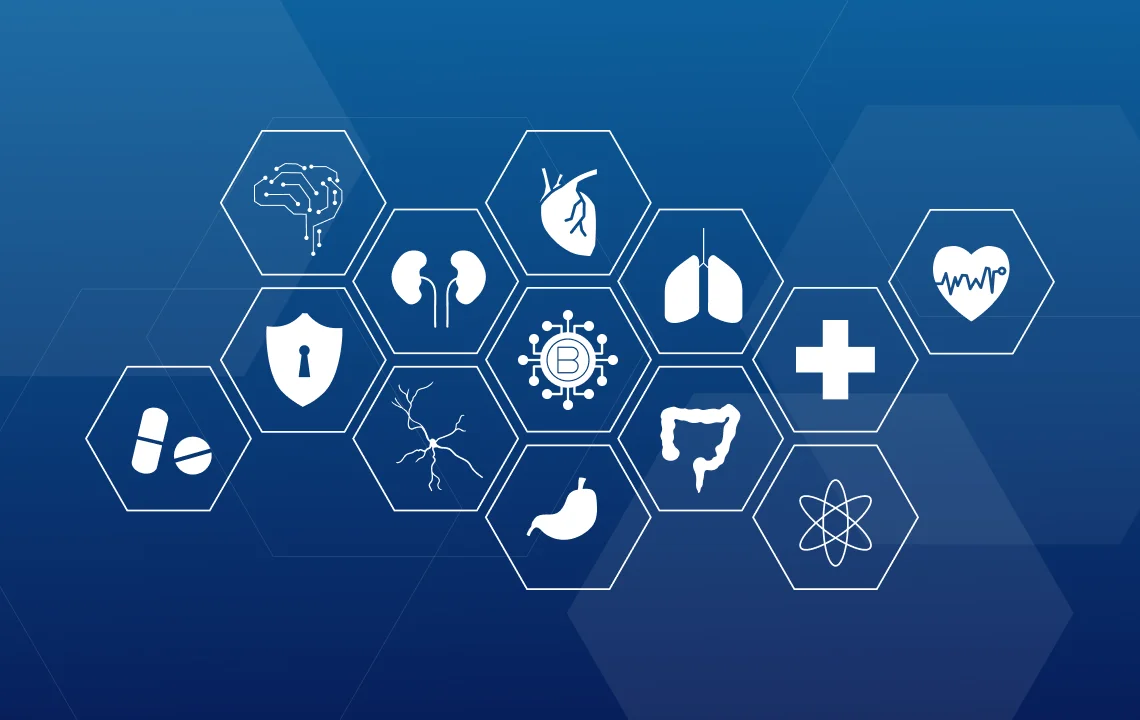How Blockchain is Advancing The Healthcare Industry in 2024?
- Business
- May 23, 2023
The Healthcare industry is one of the extensive markets globally. Every day we wake up and witness a new trend that is launched to change the landscape of the healthcare industry. Of all the cutting-edge technologies, blockchain; particularly in the healthcare industry, has taken the healthcare sector to the next level.
The tech giant Mckinsey estimates that healthcare profit pools will expand at a 4% CAGR from $654 billion in 2021 to $790 billion in 2026. So, you can calculate the extensiveness of the healthcare market.
But, have you wondered how technology has played its part in taking the healthcare industry to this position? Well, we have got a long list to thank! But, let’s talk specifically about one such technology that has been a major part of the advancement of the healthcare industry: Blockchain technology!
What is Blockchain in Healthcare?
Blockchain is a decentralized, distributed technology that allows secure and transparent data storage and transfer. In the healthcare industry, blockchain is used to create a robust and reliable system for managing the sensitive and confidential data of the patient.
By leveraging blockchain, healthcare organizations can create a tamper-proof and immutable record of patient data that can be easily accessed and shared by authorized parties. This can help to reduce the risk of data breaches and ensure the privacy and security of patient information.
One of the most promising use cases for blockchain in healthcare is in the management of electronic health records (EHRs). By using blockchain to store and manage EHRs, healthcare organizations can create a secure, decentralized, and interpolable system for sharing patient data across different providers and healthcare systems.
Another reason why blockchain is leveraged in the healthcare sector is it improves the supply chain management of pharmaceuticals and medical devices. By creating a transparent system for managing the data of patients, improving supply chain management, and enabling new models of healthcare delivery and payment.
Current Market Standing of Blockchain Technology in the Healthcare Industry
- If talking about the region that will lead the blockchain market focusing on drug discovery and clinical trials, North America and Asia-Pacific is estimated to capture over 65% of the market share by 2035. The market in Europe is expected to grow at a relatively faster pace over the coming years.
- By end-user, the biopharmaceutical & medical device companies segment held the largest market share of over 40% in 2022. This is because of substantial R&D budgets, the necessity to secure data exchange and interoperability, and a huge amount of data management by these companies in areas such as drug discovery and development.
- If we are talking particularly about the growth of the drug discovery market, the blockchain market focusing on drug discovery and clinical trials is projected to grow at an annualized rate of 22% between 2023 to 2035.
- The supply chain management application segment accounted for over 25% of the share of blockchain technology in the healthcare market in 2022.
- Pharmaceutical industries and Academic Institutes are projected to capture around 60% of the market share by 2035. Moreover, the market for hospitals is expected to grow at a relatively faster pace, over the coming years.
- As per the research done by Mckinsey, In July 2022, it was estimated that pharmacy services profit pools would grow at a 3 percent CAGR from 2021 to 2025. Their revised stats show that this growth rate will remain the same from 2021 through the additional year of 2026, with profit pools reaching $65 billion by 2026 from $55 billion in 2021.
Now that we have got to know about the current state of blockchain technology in the healthcare industry. Let’s move forward with learning about blockchain’s benefits in the healthcare sector.
Why Should Blockchain Be Incorporated Into Healthcare?
The impact of blockchain on healthcare is remarkable, here we are going to discuss blockchain’s incredible benefits in detail:
1. Patient-centric medical health records
A lack of organized data management can lead to a patient’s life at risk. The major reason behind the death of patients is medical blunders resulting from poorly coordinated treatment.
The hospitals are not aware of patient’s history to the fullest extent which is attributable to the negligence in maintaining critical data of patients. But, it’s not the case any longer, as the healthcare industry has got a potential solution: a blockchain-based system. Blockchain for medical records connects with existing electronic medical record software that acts as an overarching, single view of a patient’s record.
In blockchain technology, every time you tack on a record, be it a prescription, lab result, or a medic’s note, is decrypted into a unique hash function which is called a small string of letters and numbers in layperson terms. Every hash function is unique, and its security is absolutely robust in that it can only be decoded by the person who owns the data.
2. Robust data security
If talking about security, blockchain is acknowledged for its highly robust architecture, its distributed database allows for secure, transparent, and strengthened healthcare data management.
Blockchain uses cryptography to ensure the privacy and security of patient data. Each block in the blockchain is encrypted using complex mathematical algorithms, and the blocks are linked together using cryptographic hashes, creating an unbreakable chain of blocks that is resistant to tampering or hacking.
Blockchain provides a transparent system for tracking and auditing the movement of patient data. Every transaction in the blockchain is recorded and verified by the network of nodes, and the transaction history cannot be altered or deleted. This provides a clear audit trail for regulators and healthcare providers, which can help to prevent fraud and improve the overall security of the system.
3. Cryptocurrency payments
Cryptocurrency payments in healthcare are still a relatively new and emerging trend. While there are some healthcare providers and vendors who are starting to accept cryptocurrencies as a form of payment, it is not yet a widespread practice.
Cryptocurrency payments in the healthcare industry provide greater financial privacy and security for patients. Cryptocurrencies are typically decentralized and use advanced encryption technology to protect transactions, making them more resistant to fraud and hacking than conventional payment methods.
Another advantage of cryptocurrency payments in healthcare is that they could potentially reduce transaction fees and processing times. Because cryptocurrencies do not rely on third-party intermediaries like banks, payments can be processed more quickly and at budget-friendly costs.
4. Drug traceability
Drug traceability is the process of tracing drug products throughout the supply chain from manufacturers to patients. Blockchain is a reliable method of checking a drug’s authenticity.
Blockchain technology authorizes the building of a private network to trace and track events in the pharmaceutical supply chain and it provides time-stamped records of all the transactions that have taken place.
Every drug or drug ingredient shipped to and from authorized stakeholders at each transfer point is authenticated and has integrity, transparency, security, and provenance. Through this process, impediments in the drug supply chain can be minimized, collaboration among mutually untrustworthy stakeholders can be empowered, and a decentralized drug traceability system can be implemented that can be relied upon and is unassailable.
5. Smart contracts in Blockchain
Smart contracts are self-executing computer programs that automatically enforce the terms of the agreement between two or more parties. They are an integral part of blockchain technology and have the potential to revolutionize the healthcare industry.
Smart contracts can help to ensure the integrity and accuracy of patient data. It can be used to automatically enforce data-sharing agreements between healthcare providers, patients, and other stakeholders.
Smart contracts can also help to automate many administrative processes in healthcare, such as insurance claims processing and payment verification. By automating these processes, smart contracts can help to reduce costs and improve efficiency, while also minimizing the risk of errors or fraud.
By now, you have learned how blockchain is advancing the healthcare industry in different ways. Let’s now move forward to learning about the challenges that the healthcare industry faces while adopting blockchain technology.
What Are The Challenges of Blockchain in the Healthcare Industry?
Though blockchain technology has ample benefits to offer, still hospitals face challenges in the process of adopting blockchain. Here we are listing down the most common challenges:
1. Data Immutability
Blockchain technology is rigid in terms of security as it does not allow any changes to be done once the data is uploaded with its robust encryption. Well, this is both a merit and a demerit for hospitals. Because blockchain ensures security but restricts flexibility at the same time.
So, this gives rise to the exigency of an extension in the current architecture, allowing recording of only the edits or the one that uses clever on-chain off-chain data partitioning in the short term.
2. Lack of government support
The healthcare sector is majorly owned by the government so there is involvement of the government if hospitals think of adopting the latest technologies. It’s not possible to get the government’s agreement without a hitch.
That’s the biggest challenge for hospitals. As a consequence of its highly decentralized and distributed nature, Blockchain cannot be implemented in public hospitals. No central or third parties are there to make decisions. The decisions are usually made by blockchain technology.
3. HIPAA compliance and data privacy regulations
The Health Insurance Portability and Accountability Act of 1996 HIPAA is a federal law that required the creation of national standards to protect critical patient health information from being divulged without the patient’s permission or knowledge.
Blockchain is capable of helping healthcare organizations comply with HIPAA and other data privacy regulations. Although, there is still a debate about how to use blockchain technology in a way that complies with these regulations.
4. Lack of technical knowledge
Expecting all the users to get acquainted with all the latest hardware and software resources. Blockchain is a modern technical concept and people of all ages getting the hang of the concept is too much to expect. So, lack of technical knowledge is one of the biggest challenges the healthcare industry is facing.
We have got to learn about the most common challenges by now. Now, it’s time to move forward with learning about the surprising use cases of blockchain in the healthcare industry.
What Are The Most Surprising Use Cases of Blockchain in Healthcare?
Blockchain’s use cases in the healthcare industry are worth learning about, we have discussed some of the most surprising use cases of blockchain in healthcare. Let’s check it out:
1. Blood plasma supply chain
Blockchain technology has the potential to transform the blood plasma supply chain by providing greater transparency, traceability, and security. Blood plasma is an essential component of many life-saving medical treatments, such as immunoglobulin therapy, and ensuring the safety and quality of this supply is crucial.
By using blockchain, it is possible to track the entire journey of plasma donations from the donor to the recipient. This can help to verify the origin and quality of the plasma and ensure that it has been collected in accordance with ethical and safety standards.
Blockchain can be used to track the processing and manufacturing of plasma products, ensuring that they are being handled and stored properly. This can help to prevent contamination and ensure the safety and quality of the products.
Also, Blockchain provides a transparent and immutable record of all transactions and activities in the supply chain. This can help to prevent fraud, counterfeiting, and other forms of malpractice.
2. Blockchain speeds up medical credentialing
Daily basis tasks like verifying credentials, training, skills, medical licenses, and education–is a monotonous procedure that is done through phone and email and can take about a period of 4 to 6 months to be completed.
Talking about blockchain, it enables healthcare organizations to seamlessly monitor the data of their employees. Following the process of blockchain makes the process easier for healthcare organizations as it enhances transparency and builds trust among subcontractors.
3. Electronic health records
Nowadays, electronic health records are stored on central databases, and software is pregnable to data breaches and malware attacks. This increases the likelihood of risk to patients’ data.
With blockchain, the potential of risk towards data is relatively less as blockchain in healthcare is capable of kicking out the risk factors by providing a decentralized, secure way to store electronic health records.
Blockchain technology allows patients to access their medical details only after certifying their identity, after authorization, they can access their details.
Seeing how blockchain technology notably declines the risk of data breach, many healthcare organizations have begun implementing blockchain technology into their businesses.
4. Blockchain in Genomics
Genomic data is highly sensitive and must be kept confidential. Blockchain technology can provide secure data sharing by allowing data to be stored in a decentralized manner, where each participant has a copy of the data. This ensures that the data remains secure and tamper-proof.
Also, healthcare organizations find blockchain useful to establish the provenance of genomic data by recording the source and history of the data. This can be useful in ensuring the accuracy and reliability of the data.
By using blockchain technology to streamline healthcare operations, such as supply chain management and clinical trial data management, healthcare organizations can achieve greater efficiency and cost savings.
5. IoT security for remote monitoring
IoT is becoming a prominent part of the healthcare industry at a greater pace. IoT devices such as wearable sensors can collect details of a patient’s health including heart rate, body temperature, and blood pressure. The data is then transmitted to the healthcare experts of the central location for further analysis.
However, the process of transmitting data could be vulnerable to malware attacks and data breaches. Such attacks could prove to have a detrimental impact on healthcare organizations as the hackers can make frightful use of patients’ sensitive data.
Blockchain acts as a savior when it comes to offering robust security. One such example is IOTA, the IOTA platform is specially created to offer a secure environment for IoT devices.
The IOTA platform with the help of blockchain technology is built with a tamper-proof data ledger. This ledger can reserve data in IoT devices, as well as it tracks the movement of IoT devices.
Blockchain technology has the potential to transform many aspects of healthcare, from patient data management and clinical trials to supply chain management and telemedicine. As technology continues to evolve and mature, we can expect to see more and more innovative use cases emerge in the healthcare industry.
What is The Future of Blockchain in Healthcare?
In the coming years, we may see increased adoption of blockchain in healthcare as more healthcare organizations recognize the benefits of this technology.
As more healthcare organizations adopt blockchain technology, there will be a growing need for interoperability between different blockchain platforms and healthcare systems. Standardization efforts and the development of common protocols can help to address this challenge.
Blockchain technology can also provide patients with greater control over their health data, enabling them to selectively share their data with healthcare providers and researchers. This can lead to more personalized care and better health outcomes.
By using blockchain technology to streamline healthcare operations, such as supply chain management and clinical trial data management, healthcare organizations can achieve greater efficiency and cost savings.
Moreover, other emerging technologies such as Artificial intelligence (AI), the Internet of Things (IoT), and 5G networks, are also expected to have a significant impact on the healthcare industry. These technologies can help to improve patient outcomes, enhance operational efficiency, and create new opportunities for innovation and growth in the industry.
Ultimately, it is likely that a combination of different technologies, including blockchain, will shape the future of the healthcare industry.
But if we talk specifically about blockchain, the future of blockchain in healthcare is promising, but it will require continued investment and development to realize its full potential. As healthcare organizations continue to explore the use of blockchain, we can expect to see more cutting-edge applications of this technology over the coming years.

Concluding Statement
So, this was it! Talking about blockchain in general, blockchain has potential applications in many industries such as finance, supply chain management, and more including the healthcare industry. By providing a secure and transparent system for storing and transferring data, blockchain has the potential to revolutionize the way we store, share, and manage information.
If you are in search of blockchain technology experts, you are just a click away to explore copper-bottomed development services. Let’s begin a journey from waving to shaking hands to crafting excellence together!
FAQs on the Impact of Blockchain in Healthcare
Hospitals, diagnostic laboratories, pharmacy firms, and physicians use Blockchain networks to preserve and exchange patient data. It is possible for blockchain applications to identify severe and even dangerous mistakes in the medical field with great accuracy. Moreover, if you own a healthcare organization, you must consult blockchain experts for getting the best results from this technology.
The overall cost of blockchain development is affected by a variety of factors, such as the hourly rate of developers, the location of the blockchain app development agency, and the features and technologies of the blockchain app. All these factors determine the end cost.













